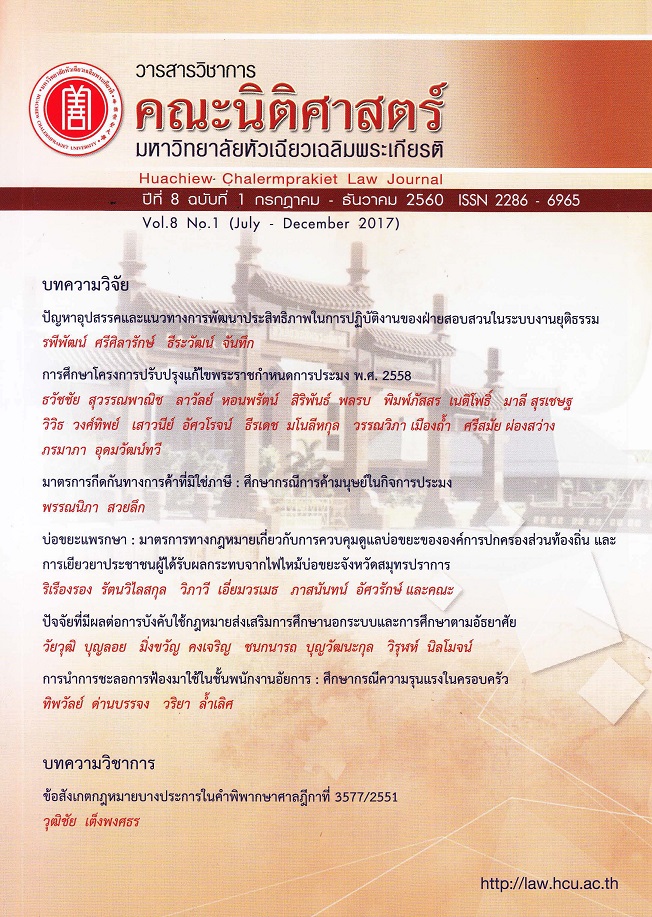มาตรการกีดกันทางการค้าที่มิใช่ภาษี : ศึกษากรณีการค้ามนุษย์ในกิจการประมง
คำสำคัญ:
มาตรการกีดกันทางการค้าที่มิใช่ภาษี, การค้ามนุษย์, แรงงานประมงบทคัดย่อ
วิทยานิพนธ์นี้มีวัตถุประสงค์ เพื่อศึกษาถึงแนวคิดและทฤษฎีที่เกี่ยวข้องกับมาตรการกีดกัน ทางการค้าที่มิใช่ภาษีกรณีการค้ามนุษย์ในกิจการประมง นอกจากนี้ยังศึกษาเปรียบเทียบนโยบายและ มาตรการทางกฎหมายที่เกี่ยวกับมาตรการกีดกันทางการค้าของไทยและต่างประเทศเพื่อวิเคราะห์หา แนวทางแก้ไขในเรื่องที่เกี่ยวกับมาตรการกีดกันทางการค้าโดยอาศัยการค้ามนุษย์ที่มีผลกระทบต่อธุรกิจ ภาคประมงของไทยให้มีความเหมาะสมและมีประสิทธิภาพอย่างเป็นรูปธรรม ประเทศไทยอยู่ในกลุ่มกำลังพัฒนาซึ่งต้องการขยายตัวทางเศรษฐกิจและด้วยสภาพภูมิประเทศ ที่ตั้งอยู่ติดกับชายฝั่งทะเล จึงทำให้ภาคอุตสาหกรรมประมงทะเลของไทยเติบโตได้อย่างรวดเร็ว และส่ง ผลให้ประเทศไทยยังคงขาดแคลนแรงงานในภาคประมงทะเลมาโดยตลอด ทั้งนี้แรงงานในเรือประมง ทะเลต้องเจอกับสภาพการทำงานที่ยากลำบาก เสี่ยงอันตราย และต้องอยู่กลางทะเลเป็นระยะเวลาที่ ยาวนาน ส่งผลให้ไม่มีแรงงานอยากทำงานในเรือประมงทะเล ผลที่ตามมาจึงทำให้เกิดขบวนการนาย หน้าค้าแรงงานประมง ซึ่งมีการลักลอบนำแรงงานต่างชาติเข้ามามากขึ้นก่อให้เกิดปัญหาการค้ามนุษย์ ด้านแรงงานตามมา จากการศึกษาพบว่าหากเวทีเจรจาทางการค้าระหว่างประเทศมีการหยิบยกประเด็นเรื่อง มาตรฐานแรงงานที่เกี่ยวโยงกับการค้ามนุษย์ขึ้นมาใช้เป็นเงื่อนไขในการค้าแล้วประเทศไทยจะได้รับผล กระทบมากน้อยเพียงใด หากมองถึงผลกระทบที่อาจจะเกิดขึ้นในอนาคตที่จะได้รับ เป็นไปได้ว่านานาประเทศอาจใช้ประเด็นนี้เพื่อเป็นการกีดกันทางการค้าในการชะลอการนำเข้าสินค้าในธุรกิจภาคประมง จากไทยซึ่งจะส่งผลกระทบต่อการส่งออกของไทยเป็นอย่างมาก และยังเป็นการทำลายภาพพจน์ของไทย ในเวทีโลก อย่างไรก็ตามแม้ประเทศไทยจะมีกฎหมายที่ให้การป้องกันหรือให้ความคุ้มครองแรงงานก็ตาม แต่การบังคับใช้กฎหมายคุ้มครองแรงงาน และกฎหมายการป้องกันและปราบปรามการค้ามนุษย์นั้นยัง ไม่มีประสิทธิภาพเท่าที่ควร โดยยังขาดการบูรณาการในแง่ของอำนาจการบังคับใช้กฎหมายเพื่อดำเนิน การทั้งต่อผู้ค้ามนุษย์รายใหญ่ และรายย่อยจึงอาจกล่าวได้ว่าการบังคับใช้กฎหมายดังกล่าวล้มเหลวอย่าง สิ้นเชิง จากปัญหาดังกล่าวผู้เขียนมีข้อเสนอแนะในการแก้ไขปัญหา โดยสร้างกลไกการบังคับใช้ กฎหมายคุ้มครองแรงงาน และกฎหมายการป้องกันและปราบปรามการค้ามนุษย์โดยจัดให้เจ้าหน้าที่ ในพื้นที่ของหน่วยงานที่เกี่ยวข้อง สามารถทำการเข้าตรวจเรือได้ตลอดเวลาโดยไม่ต้องขอหมายศาลเพื่อ ความสะดวกรวดเร็วในการเข้าตรวจสอบเมื่อมีเหตุอันน่าสงสัย และบังคับใช้กฎหมายต่อนายจ้างที่ละเมิด สิทธิแรงงานในที่ทํางานอย่างจริงจัง นอกจากนั้นแล้วควรจัดให้มีมาตรฐานการคุ้มครองแรงงานเกี่ยวกับ การจ้างงาน สภาพการทํางาน สิทธิประโยชน์ และสวัสดิการต่างๆ ที่แรงงานพึงจะได้รับตลอดจนการได้ รับการคุ้มครองในการดําเนินชีวิตอยู่บนเรือในระหว่างการทํางาน ทําให้ผู้ที่ประกอบอาชีพแรงงานภาค ประมงมีคุณภาพชีวิตที่ดีขึ้นเพื่อเป็นแรงงานจูงใจให้แรงงานเต็มใจที่จะเข้ามาทํางานมากขึ้น ส่งผลให้ ไม่เกิดภาวะขาดแคลนแรงงาน ผู้ประกอบการก็ไม่จําเป็นต้องจัดหาแรงงานอย่างผิดกฎหมาย ซึ่งจะส่งผล ให้ไม่เกิดปัญหาการค้ามนุษย์ในแรงงานภาคประมงในที่สุด
ดาวน์โหลด
เผยแพร่แล้ว
รูปแบบการอ้างอิง
ฉบับ
ประเภทบทความ
สัญญาอนุญาต
บทความหรือข้อความคิดเห็นใด ๆ ที่ปรากฏในวารสารฉบับนี้เป็นวรรณกรรมของผู้เขียนโดยเฉพาะ คณะนิติศาสตร์มหาวิทยาลัยหัวเฉียวเฉลิมพระเกียรติ และกองบรรณาธิการไม่มีส่วนรับผิดชอบหรือไม่จำเป็นต้องเห็นด้วยกับข้อคิดเห็นนั้น แต่ประการใด








